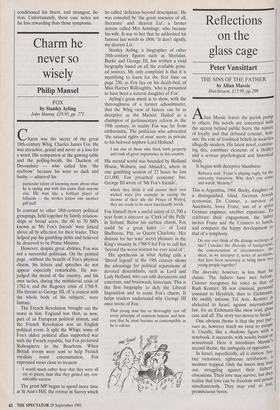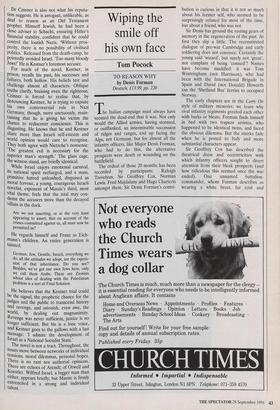Reflections on the glass cage
Peter Vansittart
THE SINS OF THE FATHER by Allan Massie Hutchinson, £13.99, pp.299 Allan Massie leaves the parish pump to others. His novels are concerned with the secrets behind public faces; the nature of loyalty and that debased concept, hon- our; the role of fossilised beliefs in societies allegedly modern. His latest novel, continu- ing this, combines elements of a thriller and a serious psychological and historical study.
It begins with deceptive blandness:
Rebecca said: 'Franz is playing rugby for the university tomorrow. Why don't you come and watch, Mummy?'
This is Argentina, 1964. Becky, daughter of a distinguished, blind, German Jewish economist, Dr Czinner, a survivor of Auschwitz, loves Franz, son of a quiet German engineer, another expatriate. To celebrate their engagement, the latter invites Franz and the Czinners to lunch, and compares the happy development to that of a symphony.
Do you ever think of the strange workings, of fate? Consider the diversity of background, the concatenation of circumstances, the sheer, as we interpret it, series of accidents, that have been necessary to bring these two young people together?
The diversity, however, is less than he claims. The fathers have met before. Czinner recognises his voice as that of Rudi Kestner, SS war criminal, personal assistant to Heydrich, then to Eichmann.• He swiftly informs Tel Aviv. Kestner la abducted to Israel, against international law, for an Eichmann-like show trial, glass case and all. The story too moves to Israel. One obvious theme is that the past pur- sues us, however much we twist to escape it. Usually, like a shadowy figure with a notebook, it succeeds, with results banal or sensational. Here it introduces Massie s second theme, the ambiguity of opposites. In Israel, superficially, all is elation. Jus- tice victorious; righteous retribution; a monster trapped. Only the lovers may lose out, struggling against their fathers obsessions. Their love may survive, but they realise that love can be freedom and prison simultaneously. They may end as lost, promiscuous bores.
Dr Czinner is also not what his reputa- tion suggests. He is arrogant, unlikeable, as deaf to reason as an Old Testament prophet. Himself Jewish, he had been a close adviser to Schacht, ensuring Hitler's financial stability, confident that he could control the loutish Nazis. 'Without pros- perity, there is no possibility of civilised politics.' Released from the death-camp, he pointedly avoided Israel. `Too many bloody Jews!' He is Kestner's foremost accuser.
For much of the novel, Kestner, in prison, recalls his past, his successes and failures, both hollow. His beliefs test and challenge almost all characters. Oblique truths clarify, bruising even the righteous. Czinner is forced to realise that, by denouncing Kestner, he is trying to expiate his own controversial role in Nazi Germany, though, more unctuously, main- taining that he is giving his victim the chance to rediscover conscience. This is disgusting. He knows that he and Kestner share more than Israeli self-esteem and world opinion would care to recognise. They both agree with Nietzche's nonsense: The greatest evil is necessary for the superior man's strength.' The glass cage, the witness stand, are briefly identical. While Israel enjoys emotional carnival, its national spirit recharged, and a mass, primitive hatred unleashed, disguised as moral fervour, a young, courageous Israeli novelist, exponent of Massie's third, most vital theme, feels that the trial may con- demn the accusers more than the decayed villain in the dock.
Are we not asserting, or at the very least appearing to assert, that on account of the crimes committed against us, all must now be permitted us?
He regards himself and Franz as Eich- mann's children. An entire generation is tainted.
German, Jew, Gentile, Israeli, everything we do, all the attitudes we adopt, are the expres- sion of that inheritance. Do you see? Besides, we've got our own Jews here, only we call them Arabs. There are Zionists whose idea of dealing with the Palestinian problem is a sort of Final Solution.
He believes that the Kestner trial could be the signal, the prophetic chance for the judges and the public to transcend history and revenge, and astonish, even awe, the world, by dealing out magnanimity. Revenge was never sufficient, justice is no longer sufficient. But his is a lone voice, and Kestner goes to the gallows with a last message: 'I admire the development of Israel as a National Socialist State.'
The novel is not a tract. Throughout, the issues move between networks of individual tensions, moral dilemmas, personal hopes. There is no rant nor authorial opinions. There are echoes of Arendt; of Orwell and Koestler. Wilfred Israel, a bigger man than either, appears briefly; but Massie is firmly entrenched in a strong and individual talent.



































































 Previous page
Previous page